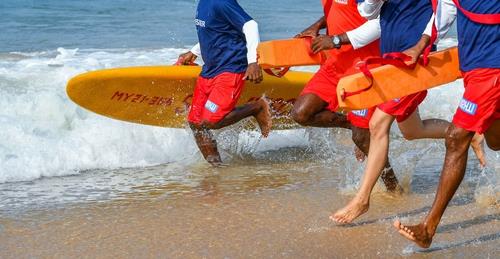
As Mercury Soars, Goa's Lifeguard Agency Issues Advisory To Stay Safe On Goa's Beaches
The advisories by Drishti Marine and the state authorities come at a time when tourists, primarily domestic travellers, have been heading to Goa, with families in tow, for their annual summer break.
"Owing to the present sea conditions, it is advisable to swim between the flags marked in red and yellow, as they indicate moderate surf and currents, while strictly avoiding the red flag areas, which indicate non-swim zones," advisory read.
"While the inviting blue sea offers relief during sweltering summers, beachgoers should be cautious of rip currents, flash currents and underwater currents before taking a dip. Lifesavers stationed along the coast are trained to conduct rescues in rough sea conditions," it said.
According to Navin Awasthi, chief executive officer at Drishti Marine, "The scorching heat can cause skin rashes, sunburns and heat strokes. Make sure to stay hydrated throughout the day and try to avoid being in direct sunlight between noon and 3 pm when the rays are the harshest."
"There are 35 lifesaver towers spread across Goa. In case of any injury, the beachgoers should approach a lifesaver for help, as each lifesaver tower is equipped with a first-aid kit," Awasthi adds.
Each morning, lifesavers map the sea currents, changes in wind patterns and underwater activity to identify safe swim zones along every beach and mark them with the red and yellow flags. Unsafe zones that are at risk of underwater and rip currents are marked by red flags, indicating that it is unsafe to swim.
"Whenever possible, always swim in proximity to lifesaver towers and lifesavers. Twenty-two beaches across South Goa and 17 beaches across the North Goa stretch are under the watchful eye of the lifesavers. It is best to visit the beach when the lifesavers are on duty between 7:30 am and 6 p.m.
"If you encounter a rip current while swimming, it is safest to stay afloat and alert the lifesaver on duty. Lifesavers are constantly monitoring the beach and are trained to identify swimmers in distress. Never swim alone. If you get into trouble, stick your hand in the air and shout for help," the advisory further reads.

Legal Disclaimer:
MENAFN provides the
information “as is” without warranty of any kind. We do not accept
any responsibility or liability for the accuracy, content, images,
videos, licenses, completeness, legality, or reliability of the information
contained in this article. If you have any complaints or copyright
issues related to this article, kindly contact the provider above.
Most popular stories
Market Research

- BTCC Exchange Announces Triple Global Workforce Expansion At TOKEN2049 Singapore To Power Web3 Evolution
- Bydfi Joins Korea Blockchain Week 2025 (KBW2025): Deepening Web3 Engagement
- SPAYZ.Io White Paper Explores Opportunities, Challenges And Ambitions In Payments Industry
- Currency Relaunches Under New Leadership, Highlights 2025 Achievements
- Salvium Solves The Privacy Paradox: Salvium One Delivers Mica-Compliant Privacy That Exchanges Can List
- FLOKI Funds Clean Water Wells In Africa Through Partnership With WWFA




















Comments
No comment